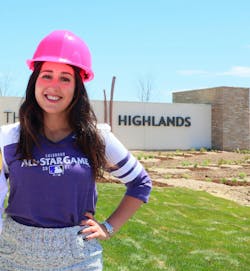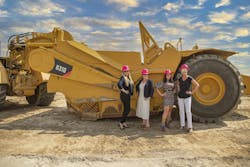Women in Construction: Carla Ferreira Takes an Early Lead in Residential Development
Carla Ferreira is only about five years into her career in residential development. In early 2017, she became the director of onsite development and principal for one of the Denver area’s largest planned communities, the Aurora Highlands—a 4,000-acre development including 12,500 residential units, 20 parks, and 21 miles of trails, with completion expected in about 13 years.
But Ferreira’s history with the industry began much earlier. “I’ve been part of real estate development since I was born,” she says.
After her mother left when Carla was an infant, Carla’s father, developer Carlo Ferreira, embraced the role of single working dad. “He took me to work with him when I was just 9 months old. He just took me everywhere he went,” Carla says of her upbringing in the Las Vegas area. “I knew that I needed to be quiet and patient and that it was a luxury to be with him and not stuck in childcare.”
On her school’s PTA board, Carlo was the only father. “They had shirts that said, ‘Hot Lunch Mom,’” Carla recalls. “He crossed out ‘Mom’ and wrote ‘Dad'.”
Along the way, Ferreira got an early education in residential development. She tagged along as her father attended city council meetings. She joined him as he traveled to and from Houston to work on his Shadow Creek Ranch development. And as a teenager, she worked directly for that community as a marketing intern.
CAREER IN CONSTRUCTION
Even so, Ferreira didn’t immediately follow in her father’s footsteps. After earning a degree in art and business and another in anthropology about a decade ago, she worked for several years in various art and fashion jobs in Las Vegas, such as assisting sales for a fine art photographer.
Then, in 2015, her father came to her with an idea. “He said he wanted to do a legacy project,” Ferreira says. That project was the Aurora Highlands. Two years later, she decided to move to Colorado and join her father’s company. “I fell in love with his vision,” she explains.
That vision, she says, appealed to her creative side. For instance, a park that runs throughout the development takes the land used for drainage conveyance and turns it into a beautiful, $180 million amenity dotted with art installations and performance plazas.
As the Aurora Highlands’ director of onsite development, Ferreira coordinates the consulting teams, including design, engineering, construction, sales, and marketing. She also manages the relationships with public and political agencies and with the development’s builders. For example, rather than having each builder grade (or level) only their own piece of land, she brought the builders together to jointly grade an entire section of the site. That collaboration has resulted in an “extraordinary” efficiency, Ferreira says: Only 5 percent of the dirt has to be moved twice, with the rest getting moved only once.
BARRIERS TO BEING A WOMAN IN CONSTRUCTION
Yet, despite her years of indirect education, Ferreira has had to quickly overcome any learning curves. Without a construction or engineering background, she had to get up to speed fast on grading—“because I needed to explain what we’re doing and pitch it to the builders and to the city,” she says.
Ferreira points to the indispensable role her father has played in her ability to shoulder the significant responsibility he’s given her. “He never treated me as a girl but as a person and equal. He always treated me as if I could do anything in the world that I wanted and there’s no hindrance to that based on gender,” Ferreira says. “My dad has been a feminist my whole life, and that’s been so crucial to me.”
Still, as a young woman executive in residential development, Ferreira has found that not everyone in the male-dominated industry shares her father’s perspective. “It’s been a bit of a shock here and there when people ‘little girl’ me or assume I’m just the developer’s daughter,” she says.
But Ferreira also draws on her relationships with seasoned women mentors—executives at the Aurora Highlands’ builders. They include Linda Purdy, Colorado division president, Tri Pointe Homes; Ricarda Dietsch, area president mountain region, Taylor Morrison Homes; Liesel Cooper, western regional president, Century Communities; and Leslie Moen, cofounder, owner, and president, Bridgewater Homes.
The many lessons Ferreira has learned from these women leaders include the importance of conducting thorough research, so that she has the knowledge and confidence to make decisions, the ability to recognize ways to improve her vision—and the conviction to stand by it.
Ferreira also has learned from the examples her mentors have set. “They don’t let their gender define them,” she says. “And I see it’s possible to be a wife, mother, daughter, and also the president of a company.”

